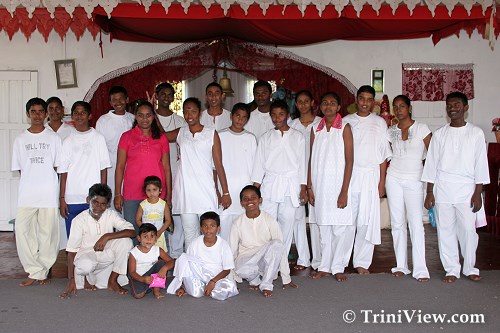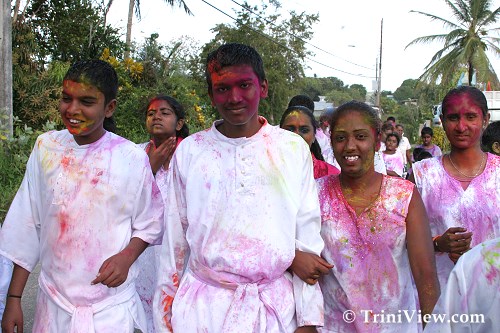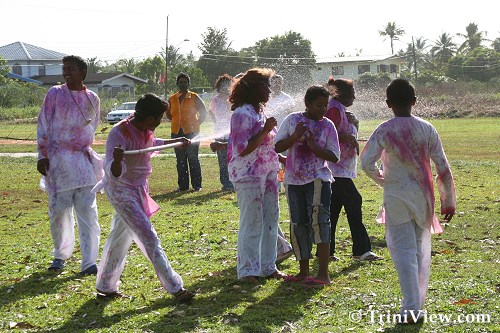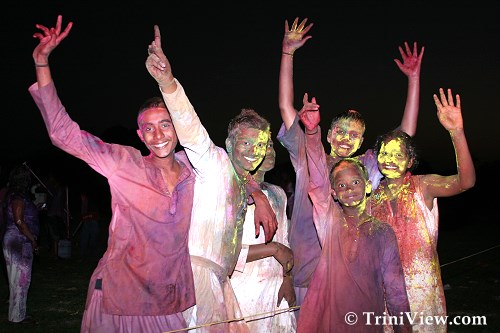 The Upper Welcome Shiv Mandir Youth Group gathers before the procession
The Upper Welcome Shiv Mandir Youth Group gathers before the procession
TriniView.com Reporters
Event Date: March 04, 2007
Posted: May 29, 2007
The celebration of Phagwa has long been a visible and much anticipated East Indian celebration. Traditionally, as March rolls around, bringing with it hot sun and colourful Poui trees in bursts of pink and yellow, it is a sign that Phagwa celebrations will soon follow; its colorful display of 'abeer' complementing the Poui blossoms. While for many, Phagwa is a joyous celebration where children and adults alike spray a multi-coloured dye called 'abeer' on the willing and unwilling, many do not really understand the meaning of this festival. On the 4th March 2007, Triniview.com visited the first ever Phagwa celebrations put on by the Upper Welcome Shiv Mandir Youth Group of Enterprise, Chaguanas, where Phagwa was celebrated in a family atmosphere at the Ragoonanan Road Sports Grounds.
Our research revealed that there seem to be two major streams of thought on the real meaning of Phagwa, called 'Holi' in Hindi or 'Phagwah' in Bhojpuri, the language that was most commonly spoken by Indian indentured labourers who came to the Caribbean. Phagwa is seen by some as a spring festival, typical of indigenous societies who celebrated the changing of the seasons. Spring is a period of new growth, fertility and new life and, as a result, was celebrated with great happiness and joy. In West Bengal, it is known as 'Dolyatra' (Doljatra) or 'Boshonto Utshob' ("spring festival"). Phagwa is also called the Festival of Colours. (Source: http://en.wikipedia.org/wiki/Holi) This seems to be directly related to the profusion of colour that comes with the new growth of the spring time. The spring season, during which the weather changes, is believed to cause fever and cold. Thus, the playful throwing of the coloured powders is said to have a medicinal significance as the colored 'abeer' is said to be traditionally made of 'Neem', 'Kumkum', 'Haldi', 'Bilva' and other medicinal herbs prescribed by 'Ayurvedic' doctors.
However, according to Caldeo Sookram, writer with the Trinidad Express, Phagwa is also rooted in the Vedic scriptural accounts, Vishnu Purana. According to Sookram, there was:
An evil King Hiranyakashipu (who) wanted to destroy his own son Prahalad for worshipping God and not himself (the king). According to the scriptures, Hiranyakashipu then made a plot with his sister Holika to destroy the child Prahalad by fire, for being disobedient to him. Instead, Holika perished in the inferno while Prahalad survived, thus establishing victory for good deeds over evil ones.
The tradition of the burning of Holika continues and precedes the actual day on which Phagwa is celebrated.
(Source: www.nalis.gov.tt/Festivals/festivals_PhagwaORHoli.htm)
In other accounts, Dave Singh of the Enterprise Hindu Mandir relates a variation, which indicates that Holika was ordered or forced by the king to lead Prahalad into his death:
The king remembered his sister, who was called Holika. She owned a magic orhni (scarf / mantilla) that allowed the wearer to step into a fire without getting burned. The king ordered Holika to wear the orhni and carry Prahalad into a fiery pit, where the boy would be burnt to ashes.
However, God would again intervene.
A strong breeze blew the orhni off Holika's head and she was the one who burned to ashes while Prahalad was miraculously saved."
This account goes on to tell of how the outraged King Hiranyakashipu then decided to kill Prahalad himself:
However, the youngster's faith in God would again triumph. A beast with a man's body and a lion's head appeared and attacked the king. His immortality disappeared and the man-lion tore him limb from limb.
The moral of the story; Prahalad's faith in God saved him; no man is bigger than God.
Phagwa, he indicates, begins with the burning of symbolic Holika, after which the festivities with 'abeer' and 'pichakaree' (instruments used to squirt or "pitch" the 'abeer') begin. The burning of 'Holika' represents the demise of Prahalad's aunt, while the 'abeer' represents new energy and rebirth, the strength of society. He also states that Holi and Phaghwa, while similar are not the same, as Holi heralds the beginning of spring while Phagwa is that aspect of Holi that incorporates singing, dancing and the use of the 'abeer' and powder.
(Source: www.nalis.gov.tt/Festivals/festivals_PhagwaTips.htm)
While there appear to be different interpretations of the meaning of Phagwa, what we got about this celebration from our time at the Ragoonanan Road celebrations was less of an emphasis on doctrine and more a sense of fun, family, community and the innovative and determined spirit of the youth of the Upper Welcome Shiv Mandir Youth Group.
 Members of the Shiv Mandir Youth Group covered in abeer along Ragoonanan Road
Members of the Shiv Mandir Youth Group covered in abeer along Ragoonanan Road
The youth group comprises teenagers and young adults from the areas of Welcome Road, Sankar Trace and Ragoonanan Road among others. Rihanna Ramdanie, president of the youth group and head organizer of the event indicated to Triniview.com that no celebration of Phagwa had ever been held by and for the community, as people usually attended the bigger, more publicized celebrations such as those at the Divali Nagar site. This year, however, the youth group affiliated with the temple in the area decided to get together, approach sponsors and with the help of parents and well-wishers held their own Phagwa celebrations which were a combination of traditional activities and family day atmosphere, at the Ragoonanan Road Sports Grounds.
When we arrived at the sports grounds, members of the youth group and their families were already making preparations, setting up tents and preparing areas to cook and sell delicacies that would be on sale to the general public. Some of the families there were familiar to us at Triniview.com such as members of the Maharaj, Seegobin and Ramdanie family whom invited us to share in the wedding of one of their daughters, Geeta, some time previously. Everyone was hard at work.
When all preparations were made, the young people assembled quite some distance away at the Shiv Mandir, all dressed in ceremonial white garments. At the Mandir, they rubbed 'abeer' all over the Murtis of Shiva, Durga, Ram, and Sita. The young people explained that this was done as a way of playing with the Murtis; they too are thus included in the playful celebrations where 'abeer' is sprayed on members of the community.
Once this more formal part was complete, the youth formed a cheerful procession as they walked from the temple to the sports grounds accompanied by the Raghu Boys Tassa Group. The infectious music caused some people to leave their homes and join the group as they sprayed each other with 'abeer'. Others looked on, promising to attend the festivities later in the afternoon. As they walked under the bright sun, the procession changed from a sea of white to a multicoloured one and the clothes of the children became soaked with purple and red 'abeer'.
Rihanna Ramdanie's mother Indra explained that 'abeer' comes in both the traditional form of crystals that must be boiled and prepared before it can be used, and a more modern type that comes ready to be sold and used in powder form. It can then be easily mixed with water for use. Children made water guns or pumps with pieces of PVC pipe which were used to spray 'abeer' on each other.
 People spray each other with abeer
People spray each other with abeer
A festive atmosphere greeted the procession at Ragoonanan Road with women preparing and selling Aloo pies, Saheenas and Phulourie; a gathering crowd; and a DJ playing lively Indian music.
The formal part of the afternoon was opened by Rihanna Ramdanie, president of the youth group, and MC's Shivana Mohan and Christopher Dookeran led the proceedings. The ceremony began with the National Anthem of Trinidad and Tobago being sung in Hindi and a prayer by members of the youth group. This was followed by the singing of 'chowtals' (songs traditionally sung during Phagwa) accompanied by musicians playing tassa drums and 'mageeras'.
Several members of the community performed. Aunty Molly, Tanty Dolwaa, and Aunty Agnes all sang chowtals and said prayers while Che Dipchand, Maniram Dilraj and Cubir played the drums, harmonium and dhantals much to the delight of members of the crowd.
As the festivities continued, the Raghu Boys entertained the crowd with lively Tassa drumming. More villagers began to gather, both adults and children, although the majority of attendees were children, mothers, grandmothers and other female members of extended families. At this point the youth group members announced a twist in the traditional Phagwa celebration, the introduction of two competitions: a watermelon-eating contest and a roti and condensed milk eating contest. This, they said, was not at all part of Phagwa tradition, but that they wanted to introduce fun, creative elements to a family day or a fun fair atmosphere.
Shivana and Christopher welcomed excited competitors in two categories, under-17 and 17-and-over for the watermelon-eating competition. As they lined up, Rihanna explained the rules: they were not allowed to use their hands, all red must be eaten off the watermelon slice and none of the fruit could remain on the table. A furious battle ensued as the crowd cheered heartily supporting their favourites and encouraging those who appeared to be floundering. At the end, 'Double D' emerged victorious in the under-17 category and Harrish Balkaran won the 17-and-over category.
As the evening wore on, there seemed to be no shortage of 'abeer' and the crowd changed from purple and red colours to blue, orange and pink as more colours were brought out to continue the festivities. The roti and condensed milk-eating competition commenced next and certainly proved to be far more challenging than the watermelon eating-competition. Roti was soaked in condensed milk, making it thick, sweet and hard to swallow. Despite the fact that competitors were allowed to drink water during their attempt, the difficulty faced by some and the alacrity of others provided no end of entertainment for the crowd who howled and shrieked, getting into the competitive spirit. The winners of this competition were Shivan Shivanand in the under-17 competition and Andy Sinanan in the over-17 category.
The Pick a Pan competition came next, in which competitors were asked difficult questions that tested their knowledge of Hinduism, Phagwa stories and Hindi words. Many found the questions quite challenging and a few people were awarded prizes for their attempts and for correct answers. Presentations were also made to the winners of the watermelon and roti and condensed milk-eating competitions.
 Youths enjoy the evening
Youths enjoy the evening
As the afternoon turned into early evening, the shadows lengthened and the crowds thinned. Families gathered together to make their way home while others continued having fun and spraying each other with 'abeer' into the night. While we were unable to get much information on some of the finer points of the history, meaning and celebration from the residents or the organizers, a wonderful time was had by all. As we departed, it appeared that the most significant part of the festivities for the residents at Ragoonanan Road was the family atmosphere, the building of community spirit and celebrating the initiative of a group of young people who pulled off 'a first' in their community.
Phagwa at Ragoonanan Road, Enterprise in pictures:
www.triniview.com/gallery/main.php?g2_itemId=163379
Homepage | Special Events | Photo Gallery
|
|
